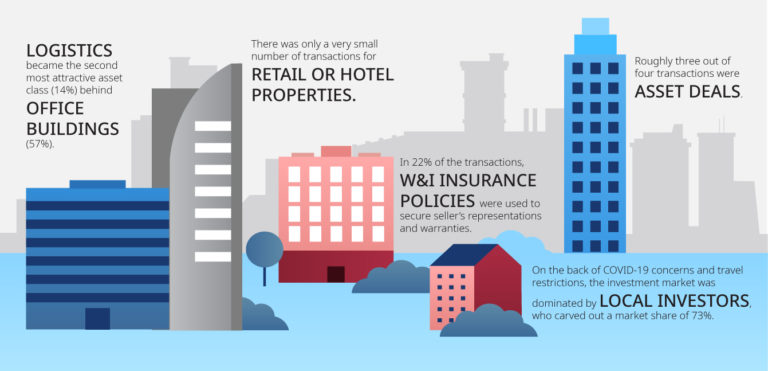The pandemic has transformed the domestic real estate sector with strong investor interest in the logistics segment, while retail and hospitality properties took a back seat last year. Despite the effects of the COVID-19 pandemic, office buildings have proven to be the most popular investment asset according to the Real Estate Intelligence Report 2022, the seventh edition in the series, in which the experts of DLA Piper Hungary give an insight into the prevailing legal practices in the Hungarian real estate market and provide an indication of the current balance of power between sellers and buyers.
According to DLA Piper Hungary’s annual real estate market analysis, office buildings continued to be in high demand despite the increase in the popularity of remote and hybrid work arrangements. Office properties accounted for around 57% of the law firm’s transactions, which represents a mere 3% decline compared to the previous year’s figure.

Source: DLA Piper Hungary
Logistics properties became the second most attractive asset class in 2021 with a share of 14%, despite the fact that the majority of logistics parks are owned by just a handful of players. Furthermore, interest in retail and hospitality properties has almost completely disappeared due to the pandemic.
“In 2021, the Hungarian commercial real estate market was characterized by two main themes: a substantial undersupply of assets and a high number of off-market deals. This resulted in fierce competition for open market assets, causing further yield compression, especially in the case of logistics assets”
– added Szilárd Kui.
Domestic investors accounted for 73% of all purchases (which is 12 percentage points higher than in 2020), which may be explained by COVID-19-related concerns and travel restrictions among other factors. At the same time, we have seen continued interest from clients both from the Far East and the Middle East; however, a limiting factor for them was that large ticket size assets are few and far between on the Hungarian commercial real estate market.
ESG considerations in the real estate market
In recent years, sustainability has made its presence felt in the real estate market as well, with environmental, social and corporate governance considerations playing an increasingly important role in the decisions of investors and tenants year after year. Developers are practically forced to obtain green certifications for new Class ‘A’ office buildings, such as LEED and BREEAM, two internationally recognized certifications.
“Sustainability has become a pivotal aspect of business operations. The objectives are clear for everyone (achieving lower CO2-emissions, improving energy efficiency and providing an appropriate work environment for tenants), and so the question isn’t whether a newly developed property should possess a green certification, but rather how sustainable operation can be guaranteed throughout the entire lifecycle of the property”
– underlined Szilárd Kui.
Further information can be found in the DLA Piper Real Estate Intelligence Report 2022 – Hungary publication available at dlapiper.realestatereport.hu.
Real Estate Intelligence Report 2022 – Hungary
DLA Piper Hungary published its first Real Estate Intelligence Report in 2016, showcasing the prevailing domestic real estate market trends based on the firm’s transactions of the previous year. The real estate law experts of DLA Piper Hungary provide a summary of the real estate market situation and an outlook for the future from a buyer, seller, investor and insurance perspective. The data used in the study is not publicly available and is based on deals where DLA Piper Hungary advised the seller or the buyer in transactions where the net asset value of the property was over €10,000,000.
Author: Szilárd Kui
How can we help? Get in touch.
Follow us on LinkedIn
Read our latest articles

Merre áramlik a tőke? Rekordszintű felvásárlási hullám formálja az M&A‑piacot
A vállalati felvásárlások és egyesülések piaca továbbra is érzékenyen reagál a geopolitikai és makrogazdasági környezet változásaira. A 2025‑ös év a bizonytalanságok ellenére – részben éppen azok hatására – az elmúlt évtized egyik legerősebb időszaka volt: a globális M&A‑volumen 41%-kal, 4,81 ezer milliárd dollárra nőtt, amely minden idők második legmagasabb értéke.

Hungary: From IPOs to Mid-Cap Growth – Key Trends in the Country’s Equity Capital Markets
The Hungarian equity capital markets experienced a dynamic period in 2025, building on the renewed issuance momentum that began in 2024. Hungary distinguished itself by the depth of domestic investor participation and the successful execution of large-scale transactions on the Budapest Stock Exchange.

From Compliance to Courtroom: Emerging Landscape of AI litigation in Hungary
This article explores how AI‑related litigation is taking shape in Hungary and across the EU: the role of ex ante safety rules under the AI Act and how growing regulatory scrutiny of these rules will trigger early disputes, as well as ex post liability mechanisms.

